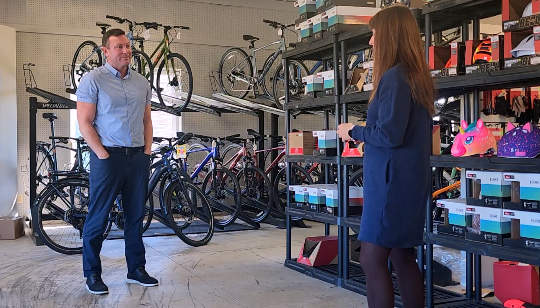KAUKAUNA (NBC 26) — Not long ago, grabbing your bike meant savings and stress-free fun. Today, increasing tariffs are putting pressure on both wallets and small businesses—turning a budget-friendly pastime into a pricier proposition.
Neighborhood bike shops like Kaukauna’s Recyclist Bicycle Company are facing fresh rounds of tariffs this year, adding a new layer of unpredictability to an already challenging market.
“It’s All Guesswork”: Recyclist Co-Owner Lora Glasel on Tariffs
For co-owner Lora Glasel, uncertainty is now the biggest hurdle.
“It’s maybe not necessarily the increased prices that are affecting us. It certainly is, but it’s a little bit more the uncertainty of what’s going to happen,” Glasel explains. “It makes it really hard for us to plan—to make sure we have what customers need and can afford.” Most bikes are up 10-15%, Glasel says, but essential accessories and parts—chains, rubber, and more—have skyrocketed, climbing over 35%. She notes smaller items hit hardest, making once-affordable grab-and-go purchases far more costly.
High-end bikes like electric-assist models are especially impacted. Tariffs stack on multiple components: batteries, rubber, metals, and the bikes themselves.
“Specifically electric-assist bikes, because they’re being tariffed on multiple items that make that bike a whole,” Glasel explains. “We sold a nice e-bike last year for $3,250; now it’s $4,300 for the same bike.”
Inventory Planning: From Data to Guesswork
Bike shop owners place orders months in advance, but pricing can spike before products arrive.
“In previous years when pricing was stable, we knew what a product would be. Now we have no idea. It makes it hard for us to plan and know we’ll have inventory customers can afford.”Those unpredictable costs mean some inventory never arrives—diverted to countries with more stable markets. For Recyclist Bicycle, uncertainty translated into lost profits, roughly equal to the wages of a seasonal part-time employee.
Small Businesses Bear the Brunt
With shrinking profit margins, shops must absorb costs or pass them to customers—who increasingly opt for big-box retailers.
“Instead of a local business paying taxes in the community, that dollar gets shifted to Target or Walmart,” Glasel says. “They’ll buy an inferior product from a big-box store instead of the place that pays taxes and volunteers locally.”When tariffs were previously lifted, prices dropped and sales soared—a sign, Glasel says, that local shops thrive when uncertainty disappears.
She urges policymakers to bring clarity:
“Small businesses pay the highest taxes and don’t get tax breaks because of these tariffs. It’s generally small business owners who are sacrificed for larger players, and that just doesn’t make sense.”
Looking Ahead
For now, business owners like Lora Glasel are bracing for whatever comes next—hoping for stable pricing that keeps customers and the local cycling community rolling forward.




